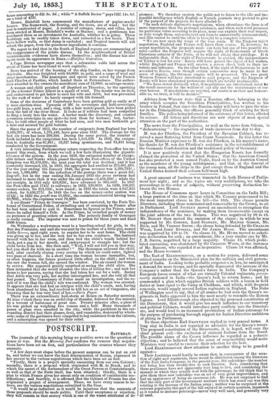POSTSCRIPT.
SAT17EDAY.
The journals of this morning bring no positive news on the question of peace or war. But the Morning Post confirms the rumour that negotia- tions have been set on foot, and particularizes the sources whence they emanate.
"A few days must elapse before the present suspense can be put an end to, and before we can know the final determination of Russia, expressed in her answer to the various negotiations which have been set on foot. "Firstly, there is a project specially emanating from our own Cabinet ; secondly, there is a proposal which originated with M. de Bruck, and to which the assent of the Ambassadors of the Great Powers at Constantinople, as well as that of the Porte itself, has been obtained ; thirdly, there is a plan to which France gives her assent only on condition of considerable mo- difications; and fourthly, it is affirmed that the Cabinet of Prussia has also originated a project of arrangement These, we have every reason to be- lieve, are the various negotiations submitted to the Czar.
"It would be as indiscreet as it would be injurious that the contents of these proposals should be made public. Until their acceptance or rejection, they will remain in that secrecy which is one of the wisest attributes of di-
plomacy. We therefore caution the public not to listen to the idle and im- possible intelligence which English or French journals may pretend to give of the purport of the projects we have alluded to.
"In such delicate diplomatic negotiations, when oftentimes the form is of more importance than the professed substance, and when each word possesses its particular value according to its place, none can explain their real import, or duly weigh them, unless the text and form be unreservedly communicated ; and this cannot be until the affair is brought to a complete solution.
" We are now upon the verge of the true crisis. If the Emperor reject negotiation, England and France well know their course. If, however, he accept negotiation, the proposals made can have but one of two possible re- sults—either the Emperor will acquire the right of Protectorate of Greek Christians subjects of the Porte, or he will not obtain that privilege. It is indisputable that, if the right of Protectorate be yielded, the independence -of Turkey is lost for ever : Russia will have gained the object of her wishes, whilst England and France will receive a severe cheek both to their in- terests and influence. On the other hand, if the right of Protectorate be not accorded to Russia, even though certain concessions may be made to her sense of dignity, the Ottoman empire will be preserved. The two great Western Powers will have interfered to good purpose, and the Emperor of Russia will have abandoned pretensions which are totally inadmissible. "We have stated distinctly what, if negotiations are entertained, must be the result necessary for the welfare of our ally and the maintenance of our own honour. If negotiations are rejected, our course is as clear and honour- able as, we trust, it will be decisive' Advices from Warsaw state that a Russian officer, belonging to the army which occupies the Danubian Principalities, has written to his brother in Poland, that since the Russian army will have to pass the win- ter in the Principalities, the officers generally think of sending for their families. The police being informed of the existence of this letter, effected its seizure. All letters and directions are now objects of most special attention on the part of the authorities.
The news from the Principalities, as well as the news from Odessa, is " disheartening " : the stagnation of trade increases from day to day.
M. von der Pfordten, the President of the Bavarian Cabinet, has re- ceived a most flattering letter from Count Nesselrode. In this letter the Russian Minister expresses to M. von der Pfordten, in his master's name, his thanks for M. von der Pfordten's assistance in the reestablishment of the Germanic Confederation and the traditional policy of Germany.
It is now positively stated that the Hungarian Kossta has formally claimed the protection of the United States; that the American Consul has also protected a man named Psaliz, fixed on by the Austrian Consul as the murderer of the young midshipman ; and that, at the funeral of the young man, all the ships in the port except those of England and the -United States hoisted their colours half-mast high.


























 Previous page
Previous page